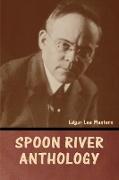- Start
- Spoon River Anthology
Spoon River Anthology
Angebote / Angebote:
Spoon River Anthology (1915), by Edgar Lee Masters, is a collection of short free verse poems that collectively narrates the epitaphs of the residents of Spoon River, a fictional small town named after the Spoon River, which ran near Masters' home town of Lewistown, Illinois. The aim of the poems is to demystify rural and small town American life. The collection includes 212 separate characters, in all providing 244 accounts of their lives, losses, and manner of death. Many of the poems contain cross-references that create an unabashedly candid tapestry of the community. The poems originally were published in 1914 in the St. Louis, Missouri, literary journal Reedy's Mirror, under the pseudonym Webster Ford.
Spoon River Anthology was a critical and commercial success. Ezra Pound's review of the Spoon River poems begins: "At last! At last America has discovered a poet." Carl Sandburg's review is similarly glowing: "Once in a while a man comes along who writes a book that has his own heart-beats in it. The people whose faces look out from the pages of the book are the people of life itself, each trait of them as plain or as mysterious as in the old home valley where the writer came from. Such a writer and book are realized here." The book sold 80, 000 copies over four years, making it an international bestseller by the standards of the day.
Meanwhile, those who lived in the Spoon River region objected to their portrayal in the anthology, particularly as so many of the poems' characters were based on real people. The book was banned from Lewistown schools and libraries until 1974. Even Masters's mother, who sat on the Lewistown library board, voted for the ban. (Masters claimed "My mother disliked [the anthology], my father adored it.") Despite this, the anthology remained widely read in Lewistown, local historian Kelvin Sampson notes that "Every family in Lewistown probably had a sheet of paper or a notebook hidden away with their copy of the Anthology, saying who was who in town."
Masters capitalized on the success of The Spoon River Anthology with the 1924 sequel The New Spoon River, in which Spoon River became a suburb of Chicago and its inhabitants have been urbanized. The second work was less successful and received poorer reviews. In 1933, Masters wrote a retrospective essay on the composition of The Spoon River Anthology and the response it received, entitled "The Genesis of Spoon River." He recounts, among other things, the "exhaustion of body" that befell him while writing, which eventually manifested in pneumonia and a year-long bout of illness as the work was being prepared for publication. He claims that the Lewistown residents who strove to identify the poems' characters with real people did so only "with poor success."
More recently, Lewistown celebrated its relationship to Masters's poetry. The Oak Hill Cemetery features a memorial statue of Masters and offers a self-guided walking tour of the graves that inspired the poems. In 2015, the town celebrated the 100th anniversary of the anthology's publication with tours, exhibitions, and theatrical performances.
Today Spoon River Anthology often is assigned in high school and college literature classes and as a source of monologues for theatrical auditions. It is also often used in second-year characterization work in the Meisner technique of actor training.
Spoon River Anthology is credited as an initial inspiration for the "audio log" storytelling device in video games as it first appeared in the game System Shock, a narrative technique that became a standard trope of narrative games. (wikipedia.org)
Folgt in ca. 10 Arbeitstagen

